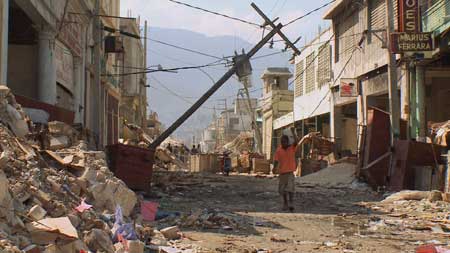
On Jan. 12, 2010, one of the most devastating earthquakes in recorded history leveled the Haitian capital, Port-au-Prince. Those responsible for handling the catastrophe, including the Haitian government and the United Nations, were among the victims. FRONTLINE correspondent Martin Smith bears witness to the scale of the disaster and takes viewers on a searing and intimate journey into the camps, hospitals and broken neighborhoods of Port-au-Prince. Featuring never-before-seen footage of the moments after the earthquake and interviews with top officials from Port-au-Prince to Washington, The Quake ultimately asks, how will the world respond?
"Beyond immediate relief efforts lies a harder task," says FRONTLINE's Smith. "The world has to decide whether to simply patch up Haiti now or to take on the far more ambitious goal of building a functional Haitian state."
The Quake explores the recent history of aid efforts in Haiti and the prospects for real change, and draws on interviews with, among others, former President Bill Clinton, special envoy to Haiti; Secretary of State Hillary Rodham Clinton; and Dr. Paul Farmer, deputy special envoy to Haiti and co-founder of Partners in Health.
Haiti has more NGOs per capita than any other country in the world. For years, foreign assistance bypassed the Haitian government, leaving it weak and vulnerable. The Quake examines how, this time, things might be done differently.
"This is an opportunity to rethink how aid works and how we, the most powerful country in this part of the world, can work with our oldest neighbor," says Dr. Paul Farmer. "So I think all that possibility is built into this tragedy."